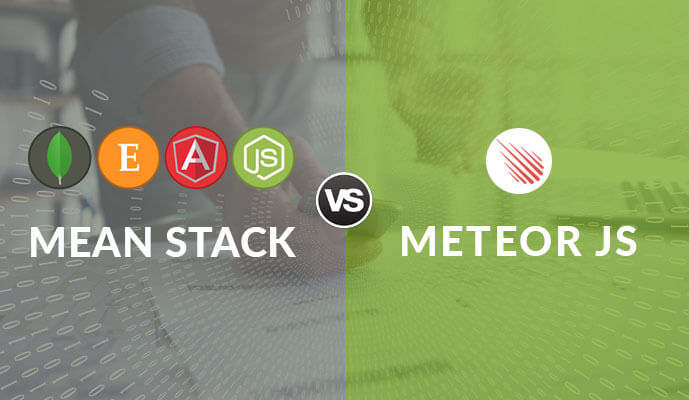
MEAN Stack Vs MeteorJS – All You Need to Know
4 October 2017
MEAN Stack
MEAN, an acronym for MongoDB, ExpressJS, AngularJS and Node.js, is a collection of technologies that facilitate the development of powerful and secure web applications. A full-stack JavaScript framework, the applications in MEAN can be written in a single language with client-side to server-side execution.
MongoDB – A schema-less, NoSQL open-source database system, it stores data in JSON-like documents instead of tables and rows. This allows quicker transfer of data between client and server.
ExpressJS – A NodeJS powered lightweight framework, it is used to build high-end web applications. Inspired by the popular Sinatra, a Ruby framework, ExpressJS allows easy processing of client-server requests.
AngularJS- With exemplary features, such as two-way data binding, AngularJS is a JavaScript framework that facilitates the development of rapid and powerful front-end applications.
Node.js- Built on the same powerful V8 JavaScript that runs Google’s Chrome, Node.js allows rapid development of highly scalable and synchronised applications.
Meteor
An open-source JavaScript web framework, Meteor has Node.Js at its heart. It allows easy prototyping and facilitates cross-platform codes for apps that work flawlessly across the web, Android and iOS. With Meteor, it’s comparatively simple to develop real-time web and mobile apps that are purely based on JavaScript.
Based entirely on JavaScript, makes Meteor more efficient as the same code will run throughout from the client to the cloud and through to the packages and database APIs. This is done via a unified Isobuild system used by Meteor.
Meteor.JS – Advantages
One Language- Meteor.js eliminates the need for the development of different codes for managing front-end, back-end and databases. With just JavaScript working under the hood, developers don’t have to shuffle with the need for managing different resources for the back-end, front-end or databases.
Scalable and Simple To Use- Galaxy platform of Meteor is a cloud service that has been designed for the deployment of Meteor Apps. With the scaling platform it offers, tasks such as the deployment of apps and monitoring of apps have a become a simpler task – even for client connected apps. Galaxy offers special development tools that allow the developers to focus on the core functionalities of the app and also furnishes seamless management of Meteor apps.
Galaxy also performs timely updating of the client codes in the most optimal manner to ensure a seamless automatic upgrade experience for the clients.
Strong Community- Meteor.js has a supportive community and numerous helpful resources to keep you updated with what’s new with Meteor. It has its own official YouTube channel with a wide number of meetups, tips, tutorials and blogs, all making it easier to get a strong grip on the technology.
Easy to Learn- You don’t have to be an expert in JavaScript or a pro in building web applications to work with Meteor.js, but a running knowledge on loops, variable and JSON will help. As a matter of fact, it is one of the easiest frameworks with a wide number of community resources that help beginners learn with greater ease. As it only uses a single language, it makes it easier for the developers to build great web applications.
Simple and Robust- MEAN Stack or Meteor is a matter of choice that should depend on your business objectives and technical capabilities of your developers. However, there is no denying the fact that Meteor offers a whole new dimension of possibilities for developing seamless web applications.




